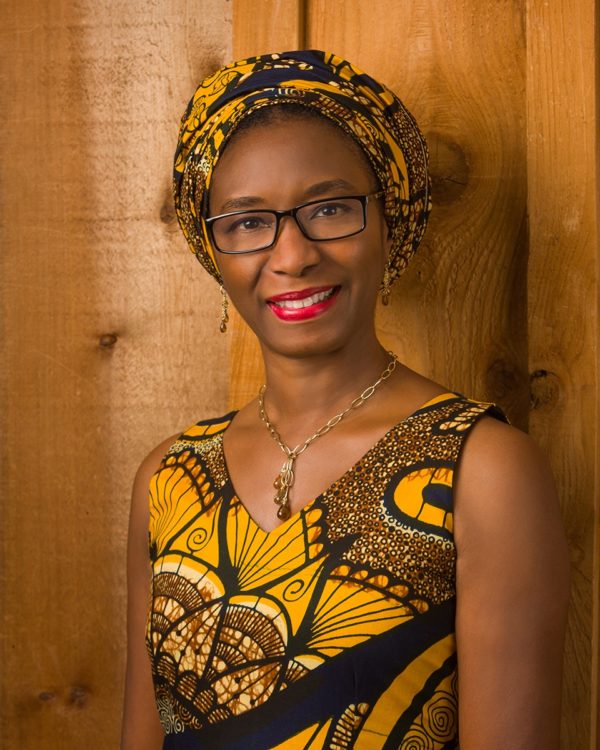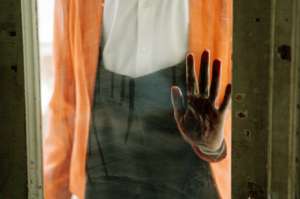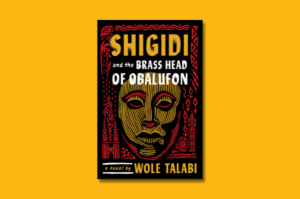
Sefi Atta’s latest novel, The Bead Collector, is historical fiction as well as an ideological treatise. But it is also, as with many of Sefi Atta’s works, a book that riffs on class and family dysfunction. In this conversation with Toni Kan, Sefi talks about the place of history in her work, growing up in Ikoyi, and the day her mother met Graham Green in a London shop.
Toni Kan
The Bead Collector is historical fiction and yet not. It is an ideological treatise yet not quite, even though you quote Fanon. How important is history to your work as a marker, as well as a point of departure, for where a people are and where they are headed?
Sefi Atta
History is very important to my work in that regard and thank you for noticing. I’m no expert on Fanon, but I used the quotation as an epigraph because I found it amusing and apt. The bourgeois phase in the history of a country like Nigeria is indeed completely useless, which is why the novel ends as it begins, with middle-class preoccupations, despite the political changeover that occurs in the story.
The quotation is for those whom it may concern. Our country doesn’t work. We know that. We also know why. What we may not be ready to accept is that progress will continue to elude us so long as we follow trajectories that are alien to us, the most damaging of which are driven by unbridled capitalism. This is not to suggest that a return to our traditional systems is the way forward; I don’t idealise them in the novel. Nigeria isn’t exactly a newly industrialised country either, but we have engaged in trading activities for centuries, and have a history of selling people for mere beads. Fast forward to what we have witnessed of late, with our governments selling us down the river by privatising public utilities, and contracting out public services, such as waste management, to foreign companies. Yet we still don’t have regular electricity supply or a clean environment. Consider also the daily incongruities that confront us here. Another mall gets built and those of us who have the means troop there because it’s convenient. We call that development, but at every traffic light along the way are beggars, most of whom are children and disabled adults. Some are amputees and presumably they are often victims of sharia law punishments. We look away only to see billboards advertising business conferences at mega churches.
Perhaps living in other countries has given me a different perspective, but for me these are not signs of a country’s progress, by which I mean its advancement towards freedom, justice and equality. The way we are going, I don’t think we’re prepared for the political impacts, social shifts and economic disparities that will come, and we still have no common ideology that unites us more than capitalism does. Yet it benefits only a minority of us and fails the rest of the country. In fact, it is the underlying cause of our moral failings, and whether or not you care about the welfare of your fellow citizens, being a member of the elite can no longer save you. There is nowhere to hide from the dysfunction, which is why Nigerians who can afford to, escape abroad as often as they can.
Even activism is for personal gain in Nigeria, so it’s no surprise that nothing improves. Should that happen, activists would be out of business. I am part of the world I complain about, but writing is not business as usual for me. It is an expression of hope that I might, in my small way, play a part in bringing about change. Now, you can’t kill the beast by feeding it, but you can slip poison into its food, which is what I attempt to do by writing honestly. In this particular novel, the Fanon quotation identifies the process we’re going through and explains our failures so far. What I then do is show we are products of complex pre- and postcolonial systems that determine our orientations. The heart of the story, though, is Remi Lawal’s difficult relationship with Nigeria.
Toni Kan
Class is a big theme in your works, from the novels to the short stories and the plays, but it often seems like a complicated subject for you because even though you would fit nicely as a member of the upper class, you take delight in poking fun at them? Why is this so?
Sefi Atta
If anyone says they fit in nicely with the Nigerian upper class, I would have to come to the conclusion that they are thoughtless. No one is responsible for their upbringing and no one deserves to be defined by any social class. My late father was the son and great-grandson of traditional rulers and he attended Oxford University. I often joke that the women in my mother’s family carry themselves as if they are royalty. They are proud of their parents, who worked hard to educate them.
When I was a child, I was called oniranu a lot at home because I poked fun at people I ought to respect. I was about six years old when I made up a song about a certain Lagos society woman. One line, I remember, said she had rashes, even though she didn’t. I’m still an oniranu at heart. I never grew out of it. In my play Lengths to Which We Go, which you’ve read, I have an aspiring character called Mrs. Babalola who calls herself upper “clarse”. In my short story “Unsuitable Ties”, I have a snobbish character called Biola whom I refer to as an authority on class since her early schooling in Switzerland. Characters like these provide comic relief for me. Blame the British as well. They left us with a social construct called class distinction, which makes no sense except to justify the oppression of the majority of Nigerians.
I suppose the reason I write about the Lagos elite at all is that they don’t become writers. Ikoyi people in particular are underrepresented in Nigerian literature. Ikoyi itself is often described as a place where rich, powerful people live. But when I was growing up there, the people I knew were not unlike those who lived on Victoria Island, and districts on the mainland such as Apapa and Ikeja, and estates such as Alaka and Palmgrove. The people who gave Ikoyi a bad name were the ones who rarely allowed other Nigerians into their social circles, except to serve and look up to them. Occasionally they were open to outsiders who had as much money and were equally materialistic. They were self-conscious but not particularly self-examining, and they were afraid to admit their vulnerability. As my protagonist Remi Lawal notes at the Dadas’ cocktail party in the novel, their lives are full of frivolous contradictions and, ultimately, they are replaced from one generation to the next. She is right about that. Ikoyi of 1976 is not the same as it is today. That society is gone now. The band and the song have changed.
Toni Kan
Family is also a big subject in your works. The complicated dynamics of a family, especially a dysfunctional one, is cannon fodder for tension and conflict and you have displayed amazing facility in mining it. Where does this come from and is there a deeper force at play?
Sefi Atta
You know, I’ve also been called a Lagos writer and a feminist writer, but I just tell stories that interest me in ways that interest me. Growing up in Ikoyi, I had friends who used drugs. Friends who discovered their fathers had girlfriends, second wives and other children. Friends whose mothers were victims of physical and emotional abuse. Friends whose parents got divorced. I never thought any of those families were dysfunctional. To me, such things were just part of family life. But I always heard about them from third parties because appearance was everything in Ikoyi, most especially the appearance of respectability. I break that down in the novel, and in that sense it’s no different from novels I’ve read about suburban life in the United States, England and elsewhere, except it has moments of political intrigue and turmoil. I juxtapose these extraordinary national moments and ordinary domestic moments to give a realistic portrayal of how we lived. Perhaps my real motive is to depict Nigeria as one big dysfunctional family.
Toni Kan
Reading The Bead Collector I was reminded of The Tailor of Panama by John Le Carré, but the difference is that while The Tailor clearly had a spy, the bead collector is a fleeting figure and no one is quite sure whether she is a spy or not, despite Tunde Lawal’s protestations. Are you familiar with The Tailor of Panama?
Sefi Atta
No. I’ve never even read a Le Carré novel, but I slept with a few in a bookcase behind my headboard. My mother was a Le Carré fan. I studied Graham Greene’s The Power and the Glory when I was at school in England, which turned me into a fan of his prose. I realise my novel ventures into white male territory by playing with the idea of espionage and satirising high society. When you do that as an African woman writer, someone is bound to ask, “Why are you here? Have you lost your way? Do you know where you are going?” But I was raised by a woman whose experiences were not limited by her gender or nationality.
I’ll tell you a couple of family stories. The first is that my mother met Graham Greene in a shop on Bond Street. Neither of us can remember the exact year it happened and she says the shop has since closed down. The funny part is that she’d never heard of him. After he left, the shop assistant mentioned his name and said he was a famous author. To this day I wish I’d been with her, just to confirm it was him. The second story is that during the coup that brought General Muhammed to power in 1975, an expatriate woman befriended my mother. We’d never seen the woman before, but she came to our house in south-west Ikoyi for a few nights and talked to my mother about the coup. On her first night she had dinner with us – osso buco. I remember this because it was a rare treat I looked forward to eating. We had no electricity at night, so my mother reheated it on a kerosene stove and we boiled rice and fried plantains. We ate dinner at the table with a battery lantern. I don’t recall details of what the woman said, but she soon stopped coming over and my mother said she had to be a spy. Of course I made fun of my mother.
It doesn’t matter whether Frances Cooke – the bead collector – was spying or not. It was enough to show there were allegations in those days, which may have been partly due to xenophobia. Ikoyi, however, was where business and political leaders lived, and the United States did have an interest in spreading neo-liberal ideas to developing countries like Nigeria.
Toni Kan
Your book is about recent history, albeit over forty years ago, but recent because many of the principal actors are still alive. You don’t seem afraid of “shaking tables”, as millennials say. Consider something like: “That one? They practically had to force him to take over.”
Sefi Atta
I’m never afraid when I write. I’m sometimes nervous after my books are published, by which time it’s too late to censor myself. When you write boldly, you get mixed reactions and I assume it will be the same with this novel. Not just because of its content, but because of the way I’ve written it. Much of what we’ve talked about may be overlooked by readers who want more to happen in an African novel, but I don’t write to accommodate their needs. Also, whenever you write about privileged Africans, someone somewhere will be upset with you. Lastly, as you know, we have a few critics in the Nigerian literary community who are caught up in the old Igbo-Yoruba rivalry, which doesn’t interest me, but their reviews reflect that. I’m used to having different responses to my work. I don’t expect everyone to appreciate what I write and I’m thankful to readers who do.
Toni Kan
So, when does The Bead Collector hit the shelves and who is publishing it?
Sefi Atta
Interlink Books published it in the United States in October and I’ll publish it in Nigeria when I’m ready.









The Bead Collector: A novel by Sefi Atta – Cafeafricana May 05, 2019 23:02
[…] Sefi Atta Talks History, Her New Novel, and Writing about the Lagos Elite: In Conversation with Toni… […]